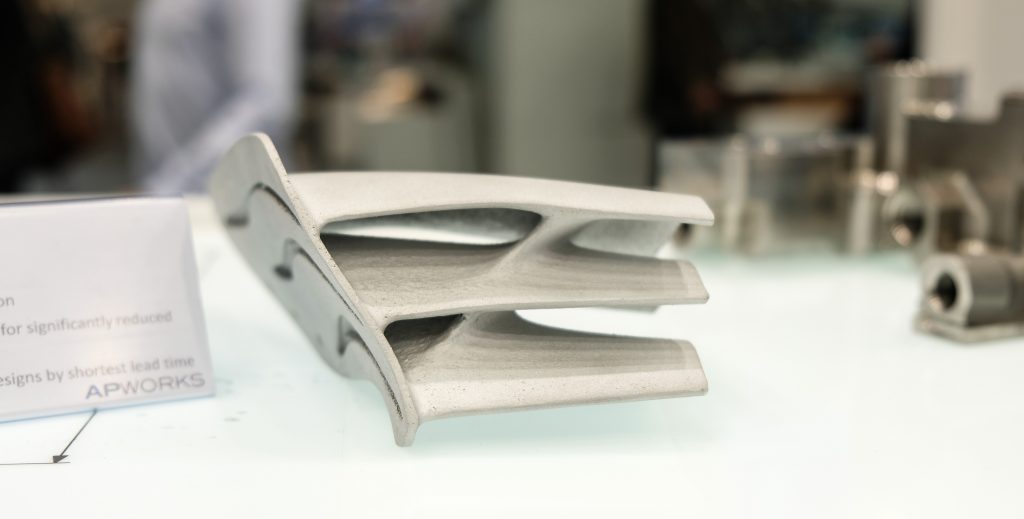The nominations for the 2021 3D Printing Industry Awards are now open. Who do you think should make the shortlists for this year’s show? Tell us now before this week’s deadline.
The UK’s Digital Manufacturing Centre (DMC) is now an approved supplier of 3D printed parts made of Scalmalloy.
Developed by aerospace 3D printing firm APWORKS, the high-performance material is reportedly the highest strength aluminum alloy available for additive manufacturing.
As part of the supplier certification, the DMC 3D printed a set of Scalmalloy components which were then inspected by APWORKS. The part qualities achieved have placed the DMC in the top 1% of Scalmalloy part suppliers worldwide.
Kieron Salter, CEO of the DMC, stated, “The DMC team is focussed on solving customer challenges, whether that means engineering for application, producing high-quality components at short notice, or bringing new high-performance AM materials to the UK market. British companies working at the frontier of their industry now have a highly qualified and knowledgeable approved supplier to help them take advantage of this revolutionary material and process.”

High-strength Scalmalloy
Blending aluminum, magnesium, and scandium, Scalmalloy was originally developed by APWORKS and its parent company Airbus for aerospace components, but has since found its place in other high-performance applications such as motorsports. Last year, the material was even added to the Formula 1 regulations as an approved AM material by the FIA (Fédération Internationale de l’Automobile).
As the highest strength aluminum alloy compatible with 3D printing, it offers properties comparable to those of 7000 series alloys. Despite its relatively low density of 2.67 g/cm³, Scalmalloy features a tensile strength of 520MPa and a yield strength of 480MPa. The material also has excellent ductility, qualifying it for use in highly loaded and safety-critical components.
Additionally, the alloy is naturally resistant to corrosion and demonstrates a high degree of microstructural stability when thermally aged. Alloying an element is usually detrimental to its corrosion resistance, but Scalmalloy uses a special strengthening mechanism that gives it a corrosion resistance equivalent to a 5000 series aluminum alloy.

Bringing Scalmalloy to the UK
With the DMC now offering Scalmalloy parts, the UK’s heavy industrial sectors are in a position to leverage a combination of high-performance material properties and the design freedom offered by 3D printing technology. Certified as a top 1% supplier of the material, the DMC will also be able to offer its customers expertise in part optimization, enabling maximum performance for minimum weight.
The applications of APWORKS’ material stretch far and wide, encapsulating use-cases in space-ready parts, racing yacht decks, and Formula 1 drivetrains.
“Scalmalloy is a fantastic addition to our capabilities – particularly for our space, aerospace, and motorsport customers,” said Salter. “Not only is it relatively straightforward to process, but it also offers many incredible performance benefits. Perhaps most importantly, it has a proven track record with established use in some of the most demanding applications in the world.”

Innovative 3D printing materials like Scalmalloy are a major factor in the advancement of additive manufacturing and its applications. Scientists from the Eindhoven University of Technology (TUE) recently developed a novel color-changing liquid crystal ink that is compatible with 3D printing technology. Until now, it’s been extremely difficult to print such materials into complex structures and devices, so the team believes its work could have major implications for applications such as decorative lighting, soft wearable sensors for health monitoring, and even augmented reality optics.
Elsewhere, Chinese 3D printer manufacturer Farsoon Technologies recently strengthened its partnership with French materials producer FABULOUS for the development of 3D printable materials for food contact and drinking water applications. The two companies are seeking to help end-users with new materials specific to industrial applications, namely BLUECARE for the food contact industry, and ACTIVE mainly suited to the water sector.
Subscribe to the 3D Printing Industry newsletter for the latest news in additive manufacturing. You can also stay connected by following us on Twitter, liking us on Facebook, and tuning into the 3D Printing Industry YouTube Channel.
Looking for a career in additive manufacturing? Visit 3D Printing Jobs for a selection of roles in the industry.
Featured image shows the DMC team 3D printing Scalmalloy on a Renishaw system. Photo via DMC.


